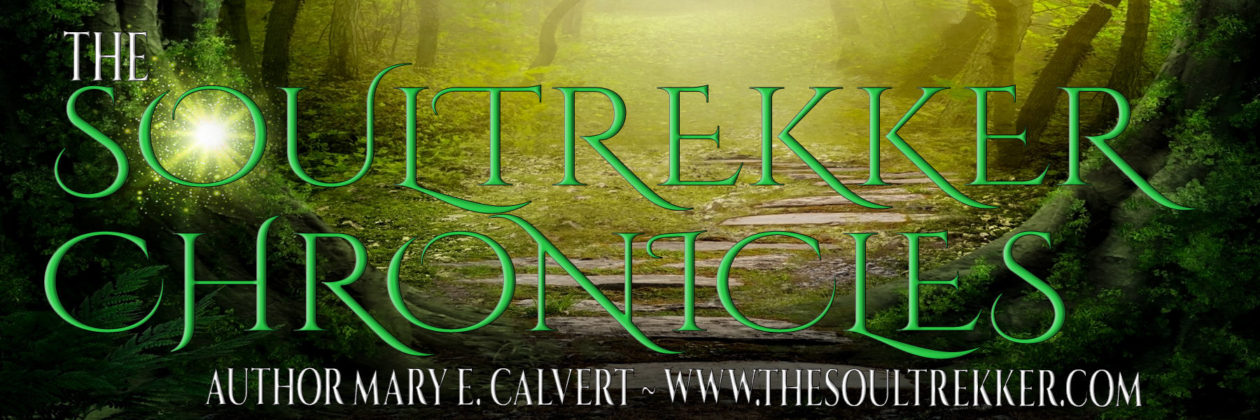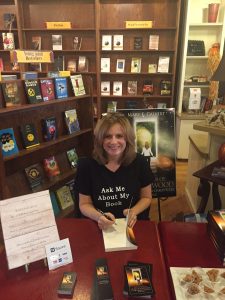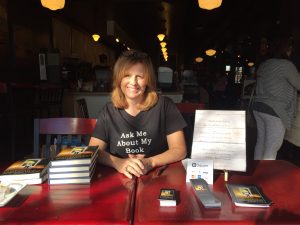As a writer, I am often asked what inspired my trilogy. The truth is, it has taken most of my life to develop a story that has as many facets, characters, and plot twists as mine.
It’s not that I started out thinking I would write an intricate epic fantasy that would span three sizeable volumes. Rather, the inspiration for The Soultrekker Chronicles happened quite unexpectedly, stemming from an active childhood imagination and a basement where I was free to dream and be anyone I wanted.
As far back as my preschool years, my mother noted that I often made up stories, a proclivity that continued once I learned to write, taking the form of “lift-the-flap” tales that usually involved lonely monsters looking for a friend. As an older elementary school student enamored of Pippi Longstocking and her adventures, I wrote tales of a headstrong female, “Peggy White”, a young feminist who outsmarted all the boys in the neighborhood with her entourage of “girl power” followers.
Around that time, my family moved to a small town in southern Virginia, into a house with a sizeable basement in which I was given three quarters to do with what I wished, the fourth quarter reserved for my mom’s laundry area and our dog’s sleeping quarters. In that basement world, boxes became forts, houses, towns, and spaceships. Anything deemed junk became fair game for my imaginary play world. I put a Groucho Marx-style nose and glasses on a sled and called it “Fred”; an old foam surfboard topped with a red wig became “Gloria”, and a puppet head I attached to an old kite became “Georgie”. An only child has to get playmates wherever she can!
Then something happened that would forever change my life: my mother brought home from the library a copy of C.S. Lewis’ The Lion, the Witch, and the Wardrobe. I quickly devoured this and all the other books that made up The Chronicles of Narnia, completely enamored with the idea of children from this world magically popping into strange and wondrous alternate realities. Soon thereafter, a friend recommended I read The Lord of the Rings, and once more I fell in love with a book that transported me to a world filled with such marvelous creatures as elves, dwarves, dragons and hobbits.
It was not long afterwards that I fancied my basement world as truly another world, one that I could go to when the pressures of budding adolescence started to overwhelm. And so I retreated there, in secret, after school and on the weekends, and my play house morphed into a play castle, a mysterious forest “appeared” in the dark corner where we kept our sports gear, and Fred, Gloria, and Georgie were given new names: Frondamein, Loralon, and Amerigo. Sound familiar? If you have read my book, then you are very familiar with those names.
In my world a desk became a city called Maldimire. I had an invisible elf friend whose name I won’t recall here as it later had to be re-worked into something less weird. There was an archery range and a village I called “West Bend” in a country I called “Bensor” after a box sitting in the corner that had come with a West Bend brand popcorn popper inside. The village eventually evolved into what I now refer to as Baeren Ford, yet the description of the village retains that of a river with a sharp bend to the west.
My dad had fashioned a cardboard barrier between my part of the basement and that last quadrant that functioned as a laundry room, with an old fireplace screen that could be opened and closed without having to step over the cardboard. It was that old fireplace screen that served as the portal between the world of my imagination and the world of reality—of homework, of piano lessons, of middle-school angst. When I was on the other side of that barrier, I was free to be whoever I wanted, including a beautiful, mysterious young woman who was adored by all (except for the bad guys), who was courageous, and who had no difficulty relating to the opposite sex.
In the book version of The Lord of the Rings, there was an obscure character by the name of Arwen whose story was really only told in the appendixes. But she was beautiful. And she was loved by a king. And I wanted to be like her, so I called myself “Arwen”, too. But that Arwen and the character that would become my “Arwyn” each have very distinct stories.
But, alas, the reality of my developing body and mind and my growing sense that I dared not be caught dead playing “make-believe” prompted my retreat back into the world of reality, back across the cardboard barrier to face what remained of middle school with trepidation. The basement went back to being nothing more than a place to do laundry, where a box was simply a storage container, and old furniture went to die. My childhood was officially over.
And yet, deep in the corridors of my mind, my imagination would not allow itself to go out without a fight. A part of me longed to have that feeling again, of being another person in a world where anything could happen. I remembered my days as “Arwen”, and in moments of boredom: on the school bus, at the orthodontist, and sometimes while sitting in church, I expanded upon Arwen’s story. Somehow, having a creative outlet helped during my more lonely moments of high school, as if focusing on one woman’s strength in overcoming adversity empowered me to fight my own battles.
After a while, the story that began in my basement and then continued solely in my thoughts grew to the point that I realized I had the rudiments of an actual book. And so, for three summers straight, I locked myself away in my room during all available free time, and I pounded away on an old electric typewriter to put what was in my mind onto paper—184 single-spaced, typewritten pages to be exact. My parents speculated that I was writing my memoir, but at seventeen years old, I had hardly lived long enough to have much of a story of my own to tell.
I recently re-read my original manuscript. And I laughed. It was . . . well . . . bad. In fact, it was all I could do to keep from falling asleep while reading it. Now I shudder at the torture I put my parents through when I finally presented my work to them at the beginning of my junior year in college, right before heading off on a study abroad program in England for the term. If my plane were to crash somewhere in the Atlantic, I at least wanted them to know the secret I had kept for so long. And even though they were polite about it, I’m sure they were quietly relieved that I had decided to pursue another career path. Something other than writing.
Some very important elements of the story were missing from the original manuscript, among them being: no Kiril, no Hamloc, no Arnuin’s Hold, and most importantly, no Margaret Ann. “Arwen” simply appeared in Bensor and even the reader didn’t know where she had come from or who she had been before. And that early version of Arwyn didn’t even mind! I liken her now to some kind of squeaky-clean Snow White character “who loved everyone and who was adored by all”. Here’s a line from the original: “A bird alighted on the branch of a nearby tree and sang the most beautiful tune that Arwen had ever heard . . . welcoming her into her first morning in Bensor.” Can’t you just hear dwarves singing in the background? My characters were paper-thin—the good guys were good and the bad guys were bad.
The sickening sweetness got booted when I re-wrote the entire storyline years later, and now you have an Arwyn who’s mad as heck about being in Bensor and the fact that she remembers hardly anything of her life as Margaret Ann Shepherd. And she can kick some serious butt when she needs to.
One-hundred-eighty-four single-spaced pages later, my story was done. It was 1984, and I had completed one year of college. Coming home that summer to finally finish my “book” was a matter of principle—it went against the grain to not finish something I had started. And so it was that I wrapped up my manuscript and put it away in a box. Knowing I’d starve before I wrote a best-seller, I was ready to fully focus on a career in psychology instead. College and graduate school were before me, and I had other things on my mind than a story I had made up to help me get through high school. I didn’t need it anymore. I was done with it.
But it wasn’t done with me.


